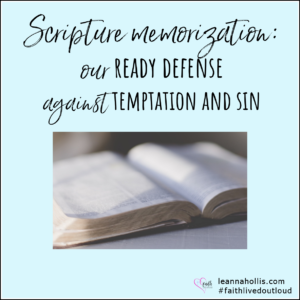When we first offered fast-food gift cards to high-risk students in exchange for quoting and explaining Scripture, people were shocked and began to ask us, “Why does Scripture memorization matter so much?” If you also wonder why we should memorize Scripture, keep reading.
God speaks through Scripture
“All Scripture is breathed out by God and profitable for teaching, for reproof, for correction, and for training in righteousness, that the man of God may be competent, equipped for every good work.” 2 Timothy 3:16,17
If you’re wondering why we should memorize Scripture, you need look no further than the day of Pentecost and the apostle Peter. This is a Scripture-memory success story. The first-century rulers, elders, and scribes often referred to Peter and John as uneducated and untrained men. Admittedly, the two disciples did not pursue a traditional course of study with a rabbi but spent three years with Jesus instead.
A quick read of Acts 2 reveals a startling truth. Peter wasn’t uneducated or untrained. On the day of Pentecost, without prepared sermon notes, iPad, or teleprompter to help him, he preached a powerful sermon in which he quoted passages from Joel 2:28-32 and Psalm 16:8-11. He also quoted verses from Psalm 69, 89, 109, 110, and 132. He referenced 1 Kings 2:10, Nehemiah 3:16, and 2 Samuel 7:12. Peter didn’t run for the nearest scroll in order to look up verses. Instead, he easily quoted this chunk of Scripture because he memorized it in advance so that it was available to him when he needed it.
Why does Scripture memorization matter? The power of the Word changes hearts.
“So faith comes from hearing, and hearing through the word of Christ.” Romans 10:17
The people wanted an explanation of the shocking events in the upper room so Peter, as leader of the disciples, stepped up. He abandoned himself to the Word of God and allowed that which is living, active, and sharper than any two-edged sword to do its powerful work of piercing hearts. The Words of God, not Peter-generated words, spoke to the people and changed them. They were pierced to the heart and ready to take action.
Three thousand people came to Christ that day after an impromptu sermon composed mostly of Scripture quotes.
As if to prove the first sermon wasn’t a fluke, Peter preached a second impromptu sermon in which he quoted Genesis 22:18, and Deuteronomy 18:15, 18. He also referenced passages in Exodus 3 and Deuteronomy 18. Again, he quoted the verses because he already knew them.
The priests, captain of the guard, and the Sadducees heard him speak. Fear and astonishment gripped them because of the power with which he delivered his message. The word of God rocked Jerusalem as thousands responded to its power. When the priests and guards arrested Peter and John and carried them before the rulers, elders, and scribes, Peter once again used scripture, this time to defend himself.
Scripture changes us:
For the word of God is living and active, sharper than any two-edged sword, piercing to the division of soul and of spirit, of joints and of marrow, and discerning the thoughts and intentions of the heart.Hebrews 4:12 nlt
Lest we think Scripture memorization is only useful so we can impress others with our remarkable memory or subdue them with conviction through the word of God, let’s take a look at at Hebrews 4:12. The word of God works first in us to discern our thoughts and intentions, pierce our hearts, and bring conviction and change. Just as it did for the crowds on Pentecost, Scripture helps us see ourselves as are: sinners before a righteous God in desperate need of a holy Savior. A clear understanding of who we are and who we aren’t is an essential part of humility. If we don’t bother to know Scripture, we’ll never allow it to change us and make us more like Jesus.
Scripture gives us hope:
The Bible contains thousands of promises from God but we can’t claim the benefits of the promises if we don’t know what they are. Knowing only comes from study. Once we “know a promise, we can cling to it and gain hope from it, but we must “know it by heart” to hold to the promise .
Scripture memorization allows us to use the power of the two-edged sword (the Word of God) more effectively.
But he answered, “It is written, “‘Man shall not live by bread alone, but by every word that comes from the mouth of God.’” Matthew 4:4
Peter repeatedly experienced the power of the two-edged sword of God. He wielded those mighty words because they were already tucked safely in his heart. Peter never graduated from the first-century equivalent of a seminary and a seminary education is not essential for us to use the word of God effectively either. Instead, he educated himself with something much more important. He learned the word of God and hid it in his heart—and we can do this, too.
Why does Scripture memorization matter? When we need truth, we have it.
“Your word is a lamp to my feet and a light to my path.” Psalm 119:105
When Peter needed truth in a hurry, it was readily available. Even more important, Peter used the truth he had, and God wielded His own words, spoken by Peter, to move in hearts and change lives. He still does.
It is not enough to participate in Bible studies and know about the Word of God. We must know Scripture by planting it in our hearts through Scripture memory. We can use Scripture in powerful ways but only if we know it in advance through memorization.
Our own journey with Scripture memorization began decades ago with what was called “learning by heart.” As we memorized passages, we stored truth in the secure vault of our hearts. We planted it deep and it remained. In times of need, those verses are readily available, every single time. A few years ago, we experienced a vision-limiting eye infection. We were unable to read Scripture, so we quoted the Scripture we knew aloud. It was balm to our soul and comfort to our weary, frightened heart.
Why does Scripture memorization matter? The Word of God is our only offensive weapon.
“I have stored up your word in my heart, that I might not sin against you.” Psalm 119:11
Another reason why we should memorize Scripture is the Sword of the Spirit, our only offensive weapon against the forces of darkness, is the Word of God. We cannot use it if we do not know it.
We are never too old to plant more Scripture in our hearts. We can memorize with God’s help, no matter what we presume, and we should. Find a passage. Read and repeat it, write it over and over again, rehearse it until we know it. The Sword of the Spirit, the Word of God, is our only offensive weapon. If we hold it close, we can stand ready to use it at the first sign of the enemy’s advance.
“But the Helper, the Holy Spirit, whom the Father will send in my name, he will teach you all things and bring to your remembrance all that I have said to you.” John 14:26Ps
When temptation comes, and it will, the Holy Spirit will remind us of what we’ve already learned. He brings verses to mind in order to help us resist. He cannot remind us of what we do not know. If we want power over temptation and sin, we must use the powerful weapon of the Word of God.
The Why
“So shall my word be that goes out from my mouth; it shall not return to me empty, but it shall accomplish that which I purpose, and shall succeed in the thing for which I sent it.” Isaiah 55:11
Remember those gift cards we mentioned at the first? Isaiah 55:11 is a promise we can trust and the motivation behind our efforts. God’s word goes forth and never returns “empty” but always accomplishes what God wants.
“Paying” high-risk students to memorize Scripture accomplishes a result for beyond the physical food their gift card purchases. When they plant Scripture in their heart, God can use it to remind them of truth when they’re convicted, encourage them when they’re discouraged, and draw them to Him when they recognize their need for a Savior. His word remains long after our influence ends and it never fails.
“Let the word of Christ dwell in you richly, teaching and admonishing one another in all wisdom, singing psalms and hymns and spiritual songs, with thankfulness in your hearts to God.” Colossians 3:16
The word of God can only “dwell” in us if we know it and keep it. Want to know more about how to memorize Scripture? Check out this article for three easy steps to Scripture memorization. Scripture Memory: Three Easy Steps
While you’re here, check out these blog posts:
How to Trust God in Hard Times
What Does it Mean to Be Beloved?
What Does it Mean to Be a Disciple of Jesus?
Why We Should Choose Humility and Let Go of Pride
Thanks for sharing your time with us today. Before you go…
- Sign up for our twice-a-month newsletter to receive exclusive stories, freebies, and more.
- Leave a comment and share this post on your social media pages or through email.
- Bookmark our website so you can visit us often.
- Take a look at Today’s Encouragement before you go. We add to this every weekday.
- Follow us on Facebook, Twitter, and Pinterest





I ran across the writing of “Peter’s Sword” written in October 8, 2002, in a Bible I had shelved and seldom read from now. When searching to see if I could find you isn’t is amazing that I was directed to this which is also about how Peter experienced the power of the two-edged sword! He laid down one and picked up another.
So proud that you are still about the work. May God’s blessing be upon you always as you be upon God’s ways always.
Love your post, Leanna! That’s such a powerful story in Acts, and inspires me. I love how you brought out that he had no notes. He declared what was in his heart, and we should to. I hope you’ll link this at #BVNetworkParty!
Enjoyed your post! My Uncle used to say, Hide the word in your heart because there may become a day when you don’t have a Bible” I was little then, & I have never forgotten!